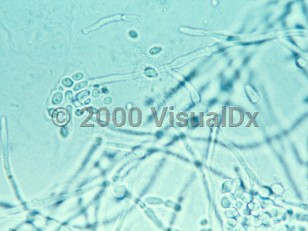Vulvovaginal candidiasis in Adult
Alerts and Notices
Important News & Links
Synopsis

Patients will often present with complaints of itching, burning, and a clumping discharge. Alternatively, there may be little vaginal discharge but instead erythema with or without scale on the vulva. While most infections are uncomplicated and limited, some women experience recurrent vulvovaginal candidiasis (4 or more episodes in 1 given year) without an obvious explanation.
Immunocompromised patients are at increased risk for candidiasis, including those with diabetes (see diabetic vulvitis), HIV, autoimmune conditions, and obesity, as well as individuals being treated with chemotherapy. Other more common potential inciting events include pregnancy, use of systemic antibiotics or steroids, frequent intercourse, use of immunosuppressive medication, sex with a new partner, certain vaginal lubricants or washes, oral contraceptive pills, and estrogen therapy.
Vulvovaginal candidiasis is not a sexually transmitted disease.
Codes
B37.31 – Acute candidiasis of vulva and vagina
SNOMEDCT:
72934000 – Vaginal candidiasis
Look For
Subscription Required
Diagnostic Pearls
Subscription Required
Differential Diagnosis & Pitfalls

Subscription Required
Best Tests
Subscription Required
Management Pearls
Subscription Required
Therapy
Subscription Required
Drug Reaction Data
Subscription Required
References
Subscription Required
Last Updated:06/29/2021

